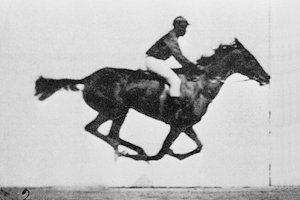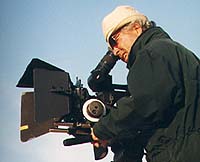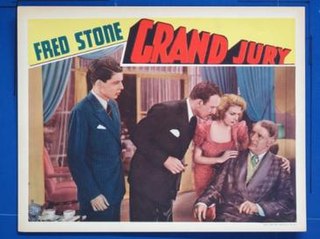
The Academy Awards, popularly known as the Oscars, are awards for artistic and technical merit in the film industry. They are regarded by many as the most prestigious and significant awards in the entertainment industry worldwide. Given annually by the Academy of Motion Picture Arts and Sciences (AMPAS), the awards are an international recognition of excellence in cinematic achievements, as assessed by the Academy's voting membership. The various category winners are awarded a copy of a golden statuette as a trophy, officially called the "Academy Award of Merit", although more commonly referred to by its nickname, the "Oscar". The statuette depicts a knight rendered in the Art Deco style.
The Academy Award for Best Picture is one of the Academy Awards presented annually by the Academy of Motion Picture Arts and Sciences (AMPAS) since the awards debuted in 1929. This award goes to the producers of the film and is the only category in which every member of the Oscars is eligible to submit a nomination and vote on the final ballot. The Best Picture category is usually the final award of the night and is widely considered as the most prestigious honor of the ceremony.
The Academy Award for Best Animated Feature is given each year for animated films. An animated feature is defined by the Academy as a film with a running time of more than 40 minutes in which characters' performances are created using a frame-by-frame technique, a significant number of the major characters are animated, and animation figures in no less than 75 percent of the running time. The Academy Award for Best Animated Feature was first awarded in 2002 for films made in 2001.

The Last Emperor is a 1987 epic biographical drama film about the life of Puyi, the final Emperor of China. It is directed by Bernardo Bertolucci from a screenplay he co-wrote with Mark Peploe, which was adapted from Puyi's 1964 autobiography, and independently produced by Jeremy Thomas.

Quo Vadis is a 1951 American epic historical drama film made by Metro-Goldwyn-Mayer (MGM) in Technicolor. It was directed by Mervyn LeRoy and produced by Sam Zimbalist, from a screenplay by John Lee Mahin, S.N. Behrman, and Sonya Levien, adapted from the novel Quo Vadis (1896) by the Polish Nobel Laureate author Henryk Sienkiewicz. The score is by Miklós Rózsa and the cinematography by Robert Surtees and William V. Skall. The title refers to an incident in the apocryphal Acts of Peter.

Universal Pictures is an American film production and distribution company owned by Comcast through the NBCUniversal Film and Entertainment division of NBCUniversal.

The Snowman is a 1982 British animated television film and symphonic poem based on Raymond Briggs' 1978 picture book The Snowman. It was directed by Dianne Jackson for the British public service Channel 4. It was first shown on 26 December 1982, and was an immediate success. It was nominated for the Academy Award for Best Animated Short Film and won a BAFTA TV Award.
The decade of the 1920s in film involved many significant films.

Film4 Productions is a British film production company owned by Channel Four Television Corporation. The company has been responsible for backing many films made in the United Kingdom. The company's first production was Walter, directed by Stephen Frears, which was released in 1982. It is especially known for its gritty, kitchen sink-style films and period drama.

Clive Owen is an English actor. He first gained recognition in the United Kingdom for playing the lead role in the ITV series Chancer from 1990 to 1991. He received critical acclaim for his work in the film Close My Eyes (1991) before earning international attention for his performance as a struggling writer in Croupier (1998). In 2005, he won a Golden Globe and a BAFTA Award and was nominated for an Academy Award for his performance in the drama Closer (2004).
A production company, production house, production studio, or a production team is a business that provides the physical basis for works in the fields of performing arts, new media art, film, television, radio, comics, interactive arts, video games, websites, music, and video. Production teams consist of technical staff to produce the media. Generally the term refers to all individuals responsible for the technical aspects of creating a particular product, regardless of where in the process their expertise is required, or how long they are involved in the project. For example, in a theatrical performance, the production team has not only the running crew, but also the theatrical producer, designers and theatrical direction.

The National Board of Review of Motion Pictures is a private non-profit organization of New York City area film enthusiasts. Its awards which are mostly announced in early December are considered an early harbinger of the film awards season that culminates in the Academy Awards.

Cimarron is a 1931 pre-Code epic Western film directed by Wesley Ruggles, starring Richard Dix and Irene Dunne, and featuring Estelle Taylor and Roscoe Ates. The Oscar-winning script was written by Howard Estabrook based on the 1930 Edna Ferber novel Cimarron. It would be RKO's most expensive production up to that date, and its winning of the top Oscar for Best Production would be only one of two ever won by that studio. It is also one of three Westerns to ever win the top honor at the Academy Awards, the others being Dances with Wolves (1990) and Unforgiven (1992). Epic in scope, spanning forty years from 1889 to 1929, it was a critical success, although it did not recoup its production costs during its initial run in 1931.

Stephen Woolley is an English film producer and director, whose prolific career has spanned over three and a half decades, for which he was awarded the BAFTA award for Outstanding British Contribution to Cinema in February 2019. As a producer he has been Oscar-nominated for The Crying Game (1992), and has also produced multi-Academy Award nominated films including Mona Lisa (1986), Little Voice (1998), Michael Collins (1996), The End of the Affair (1999), Interview with a Vampire (1994), and Carol (2016). He currently runs the production company Number 9 Films with his partner Elizabeth Karlsen.
The Cultural District is a fourteen-square block area in Downtown Pittsburgh, USA bordered by the Allegheny River on the north, Tenth Street on the east, Stanwix Street on the west, and Liberty Avenue on the south.

The Queen is a 2006 British biographical drama film that depicts the death of Diana, Princess of Wales in 1997. Initially, the Royal Family regard Diana's death as a private affair and thus not to be treated as an official royal death. This is in contrast with the views of Prime Minister Tony Blair and Diana's ex-husband, Prince Charles, who favour the general public's desire for an official expression of grief. Matters were further complicated by the media, royal protocol regarding Diana's official status, and wider issues about republicanism.

A film, also called a movie, motion picture or moving picture, is a work of visual art used to simulate experiences that communicate ideas, stories, perceptions, feelings, beauty, or atmosphere through the use of moving images. These images are generally accompanied by sound, and more rarely, other sensory stimulations. The word "cinema", short for cinematography, is often used to refer to filmmaking and the film industry, and to the art form that is the result of it.

The cinema of Tunisia began in 1896, when the Lumière brothers began showing animated films in the streets of Tunis.

Grand Jury is a 1936 American crime drama film directed by Albert S. Rogell using a script by Joseph A. Fields and Philip G. Epstein, based on a story by James Edward Grant and Thomas Lennon. Produced and distributed by RKO Radio Pictures, it premiered in New York City on July 31, 1936, and was released nationwide the following week on August 7. The film stars Fred Stone, Louise Latimer and Owen Davis, Jr.
The Living Doll was a 1908 French short silent Christmas film by Georges Méliès. The film, combining American ideas about Santa Claus with Méliès's fantasy style and a modern touch, followed the adventures of a young girl, Polly, one Christmas night, as she escapes kidnappers, travels to Santa's palace, and—by changing places with a large doll—goes with Santa on a giftgiving journey by airplane.













